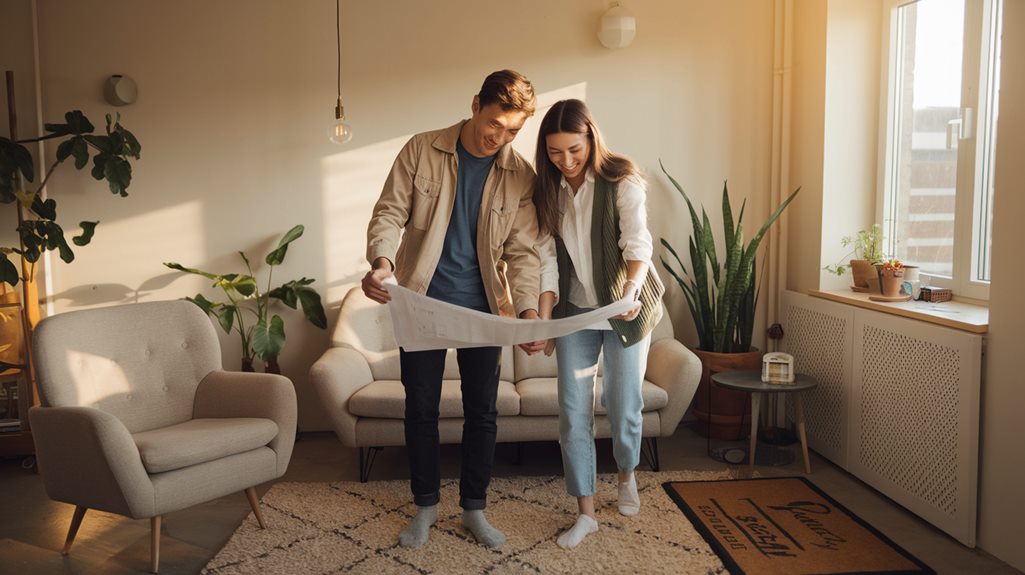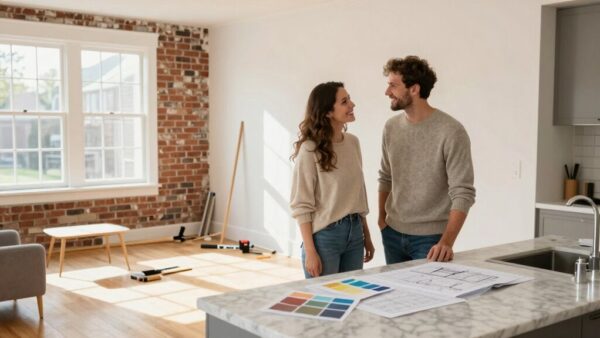Buying your first home is exciting but can also feel a bit scary. Our guide is here to help you!
First, check how much money you have. Make sure your credit score is good and you have some savings.
Next, decide how much you can spend on a house. This will make it easier to find the right one.
Look at different types of loans and get pre-approved. This means a bank says you can borrow money, which helps you when you make an offer.
Then, learn about the neighborhoods you like. Look for safe areas and good schools.
Work with a real estate agent who can help you find your dream home.
When you find a house you like, make an offer. Don't forget to check the house carefully to see if there are any problems.
Finally, when everything looks good, you can close the deal and get your new home!
Our guide has more tips to help you through each step.
Ready to start building equity in your own Michigan home? Get your personalized home loan quote today.
Assess Your Financial Health

Before you think about buying your first home, it's really important to check how you're doing with money. First, look at your credit score. This number helps banks decide if they'll give you a loan.
Next, try to pay off some of your debts. Less debt means a better credit score, which makes banks like you more.
Make a plan to save money so you can pay for things like a down payment and closing costs. It's also smart to have some extra money saved up for surprises, like a broken pipe or a flat tire.
Make sure your job is steady and that you have money coming in regularly. Banks like to see that you have a good job.
Lastly, think about what you want to do with your money in the future.
You might be closer to buying your home than you think
Take our 2-minute home buyer readiness quiz to see how prepared you really are – no credit check required.

Michigan residents, unlock the door to your new home. Request your home loan quote from Treeside Financial today.
Set a Realistic Budget
Making a budget is very important when you want to buy a home.
First, look at your money. Think about how much you earn, how much you spend, and any money you owe. This will help you see how much you can really afford.
Knowing this will keep you from buying a home that's too expensive. It will make it easier to find homes that you can buy and make the whole process more fun!
Assess Financial Situation
Are you thinking about buying your first home? That's exciting! But before you jump in, it's important to check if you're ready.
Let's look at some easy things to think about:
- Credit Score: This is like your report card for money. Try to have a score of at least 700. A good score helps you get better loan rates.
- Debt-to-Income: This shows how much money you owe compared to how much you make. It's best to keep this number below 36%.
- Savings: You should try to save up 20% of the price of the home you want. This will help when it's time to buy.
- Monthly Expenses: Keep track of what you spend each month. Try to lower any extra costs that you don't really need.
Buying a home can be a big dream, and you can make it happen! Just take these steps to see if you're ready for this big adventure.
Determine Maximum Affordability
When you want to buy your first home, it's important to know how much money you can spend. If you make a budget, you can make sure your new home doesn't cost too much.
First, find out how much money a bank will lend you. They look at how much you earn and your credit score. But just because you can borrow a lot doesn't mean you should.
Think about your other costs, like bills for water, gas, and insurance. You should also think about things you like to do, like eating out and having fun. This will help you see what you can really afford.
When you have a good budget, you can buy a home that feels right for you. Then, you can feel happy and safe in your new neighborhood!
Explore Mortgage Options

When looking for a mortgage, it's important to compare interest rates to get the best deal.
Think about whether you want a fixed loan, where the rate stays the same, or a variable loan, where the rate can change. Each type has its own good points.
Also, check for government programs that can help you buy a home. They can make it easier and cheaper!
Compare Interest Rates
Looking for a mortgage can be a big job, but it's important to compare interest rates. This step can help you save a lot of money over time.
First, watch how interest rates change. This can help you decide the best time to pick a rate. When you compare mortgage rates, you can find the best deals that fit your budget and your life.
Doing this helps you feel good about your choice and connect with other smart homebuyers. Remember, you aren't just picking a loan; you're making a choice that will impact your future money.
Take your time, make smart choices, and you'll find a mortgage that works for you.
Fixed vs. Variable Loans
When you look for the best mortgage, think about what kind of loan is right for you: fixed or variable. A fixed loan means your payments stay the same all the time. This can make you feel safe, especially if you want to stay in your new home for a long time.
A variable loan might start with lower payments, but the cost can go up and down, which can make it hard to plan your budget.
Here are some things to think about:
- Fixed loan good things: Payments are the same, and you know what to expect.
- Variable loan not-so-good things: Payments can change, and it might be hard to keep track of your money.
- What you want for the future: Make sure your choice fits your plans.
Picking the right loan helps you feel like you belong to a place where people care about being safe with their money.
Government Assistance Programs
Government help programs can really change things for people buying their first home. Imagine getting money to help with your down payment or even grants that make it easier to buy a house.
You can also learn about taxes and how to be a smart homebuyer. This helps you feel good and ready for such a big step. Many states have programs that can help pay for closing costs, which can make buying a home less stressful.
If you have a low income, there are special loans from the government that can work for you. These programs are here to help everyone feel like they belong in their community by making it easier to own a home.
Check out these chances and find the best way to get your first home, with help all along the way!
Get Pre-Approved
Getting pre-approved is an important step when you want to buy a home. It helps you know how much money you can spend and makes you look good to sellers. The pre-approval process checks your money situation, credit score, and how much you earn to see what a lender can offer you.
Here's why getting pre-approved is so important:
- Feel Confident: You'll know exactly how much house you can buy.
- Stand Out: You'll look more serious to sellers, especially when many people are looking for homes.
- Quick Process: When you find the right home, it helps you get the loan faster.
Getting pre-approved makes buying a home easier!
Research Neighborhoods

When you're buying your first home, it's really important to look at the safety of the neighborhoods. You want to know how safe it is, so you and your family can feel good living there.
Also, check out the schools in the area. Good schools can help your home be worth more money later on when you want to sell it.
Crime Rates Analysis
Before you buy your first home, it's important to understand crime rates. This helps keep you safe and can affect how much your home is worth.
Looking at crime rates and how safe people feel can help you see if the neighborhood is a good place to live. Joining groups like neighborhood watch can make you feel safer and part of the community.
Here are some things to think about:
- Crime Statistics: Look at the latest crime numbers to know how safe the area is.
- Police and Emergency Services: Check how well local police and emergency services work. Are they around when needed?
- Community Activities: Get involved in local events. This helps build friendships and makes everyone feel more secure.
Following these tips can help you find a place where you feel happy and safe.
This way, your home will be a smart investment for the future. Choose neighborhoods that match what you want for safety and community.
School District Quality
When picking your first home, it's really important to check out the schools in the area, especially if you have kids or plan to have them. Good schools can help your child have a bright future. So, take a look at the schools and what they teach.
Look for neighborhoods that have great community resources and fun after-school activities. These can help kids grow and learn in different ways. Smaller class sizes are usually better because teachers can give more attention to each student, which helps them do well in school.
It's also good when parents get involved in their kids' schools. When parents help out, schools tend to be better places for kids to learn.
Diversity in schools is important, too. It helps kids learn about the world and get ready for the future.
Hire a Real Estate Agent
Buying your first home can feel really big and confusing. But getting help from a smart real estate agent can make everything easier and faster. They know a lot about homes and can help you understand the market better.
When you work with an agent, you aren't just getting someone to help you; you're joining a team that cares and knows a lot.
Here are some good reasons to think about hiring an agent:
- Market Knowledge: They can tell you what homes are worth and what neighborhoods are like.
- Negotiation Skills: They'll talk to sellers for you to help you get a good price.
- Time Savings: Agents can help you find the right homes quickly, so you don't waste time.
Even though you need to think about how much agents cost, the help they give often makes it worth it. They can help make buying your home a happy and easy adventure!
Start House Hunting

Starting to look for a house is super exciting!
It's time to think about what kind of neighborhood you want to live in and what features you want in your new home. Imagine living in a place where you feel happy and at home, close to parks, schools, and shops that you like.
Next, think about what you want in your house.
Do you want a big backyard to play in? Maybe a kitchen where you can cook with your family? Or a warm fireplace to sit by?
Make a list of these things to help you find the right place. Work with your real estate agent to find homes that fit what you want.
Make an Offer
When you find the perfect house, it's time to make an offer. You want to stand out because many people want the same home.
Here are some easy steps to help you get your dream home:
- Learn About the Market: Look at what other houses are selling for. This will help you know a good price to offer.
- Be Open to Changes: If you can be flexible on things like when to move in, it might make the seller happy.
- Have Your Money Ready: Get a letter from the bank that says you can borrow money. This shows you're serious about buying the house.
Good luck! You can do it!
Conduct Home Inspections

Getting a home inspection is a really important step when buying a house. It helps you make sure you're making a good choice. Using a home inspection checklist can help you check that the house is right for you. It's also very important to choose a good home inspector. They can find problems that you might not see at first. This helps you feel good about your decision and know that you're part of a friendly community.
Here's what you can do:
| Step | Action |
|---|---|
| Make a List | Write down what to check |
| Find an Inspector | Pick a good inspector |
| Talk About What You Find | Go over the results with the inspector |
The home inspector can give you helpful information. This can save you money later on. Remember, this is about your future and being part of a great community.
Close the Deal
After checking that the house is in really good shape, you can get ready to buy your dream home!
To make sure everything goes well when you close the deal, here are some easy tips to follow:
- Know the neighborhood: Look at other homes that have sold nearby. This will help you make a smart offer.
- Use what you found during the inspection: If you noticed any problems with the house, you can ask the seller to fix them or lower the price.
- Get your money ready: Make sure your loan is approved so you can show you're ready to buy.








